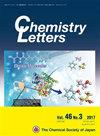Morphological effect of TiO2 nanoparticles in TiO2/g-C3N4 heterojunctions on photocatalytic dye degradation
IF 1.1
4区 化学
Q3 CHEMISTRY, MULTIDISCIPLINARY
引用次数: 0
Abstract
The effects of TiO2 nanoparticle (NP) morphology on the photocatalytic activity of physically assembled TiO2 NP/g-C3N4 heterojunctions (TCNPHY) was investigated. Spherical, spindle and cubic TiO2 NPs were synthesized and separately supported on g-C3N4 nanosheets to form physically assembled TCNPHY catalysts. The photocatalytic activity for methylene blue (MB) degradation observed for TCNPHY with the cubic TiO2 NPs supported higher light absorption and a lower recombination rate; therefore, this was an adequate catalyst for the construction of catalytically active heterojunctions. The cubic-TiO2 TCNPHY exhibited a degradation rate that was 2.2 times higher than that for the g-C3N4 nanosheets alone.TiO2/g-C3N4 异质结中 TiO2 纳米粒子的形态对光催化降解染料的影响
研究了TiO2纳米粒子(NP)形态对物理组装TiO2 NP/g-C3N4异质结(TCNPHY)光催化活性的影响。合成了球形、纺锤形和立方体 TiO2 NPs,并分别支撑在 g-C3N4 纳米片上,形成了物理组装的 TCNPHY 催化剂。观察到立方 TiO2 NPs 的 TCNPHY 具有更高的光吸收和更低的重组率,因而具有降解亚甲基蓝(MB)的光催化活性,是构建催化活性异质结的理想催化剂。立方二氧化钛 TCNPHY 的降解率是单独 g-C3N4 纳米片的 2.2 倍。
本文章由计算机程序翻译,如有差异,请以英文原文为准。
求助全文
约1分钟内获得全文
求助全文
来源期刊

Chemistry Letters
化学-化学综合
CiteScore
3.00
自引率
6.20%
发文量
260
审稿时长
1.2 months
期刊介绍:
Chemistry Letters covers the following topics:
-Organic Chemistry-
Physical Chemistry-
Inorganic Chemistry-
Analytical Chemistry-
Materials Chemistry-
Polymer Chemistry-
Supramolecular Chemistry-
Organometallic Chemistry-
Coordination Chemistry-
Biomolecular Chemistry-
Natural Products and Medicinal Chemistry-
Electrochemistry
 求助内容:
求助内容: 应助结果提醒方式:
应助结果提醒方式:


